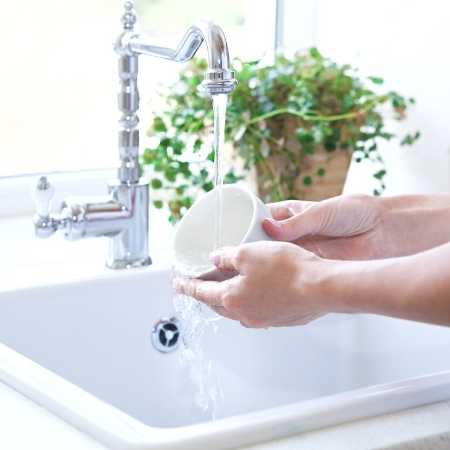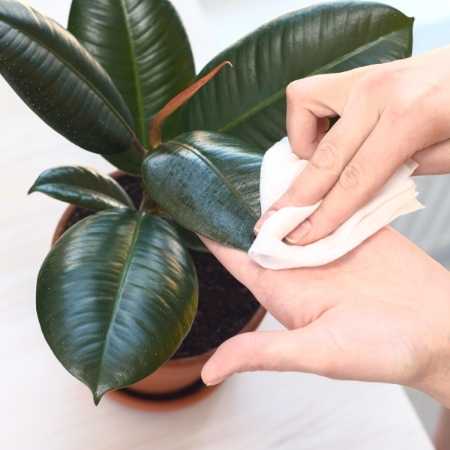Meditation typically involves an intense awareness of the present moment and the ability to dwell in and reflect on your internal state. While meditation is usually performed in padmasana(lotus posture) with your eyes closed, it’s possible to integrate a degree of mindfulness into everyday activities, even house chores.
The most effective way to meditate during housework is to bring your awareness to the present moment and become absorbed in the task at hand. Do house chores, such as cooking, washing dishes, cleaning, laundry, or throwing out the garbage. While you’re at it, feel and focus on the moment.
While you may not be meditating in the complete sense of the word, shifting your focus to the present moment will allow you to go inward to a significant extent. Read on as I explore how you can enter a meditative state while performing everyday house chores.
The Difference Between Meditation and Mindfulness
Before learning to meditate while doing housework, there’s a crucial distinction you need to be aware of — the difference between mindfulness and meditation. Mindfulness is an integral part of meditation. The main difference between meditation and mindfulness is that you can practice mindfulness without meditation, but you can’t practice meditation without mindfulness. Mindfulness can be practiced at any moment, while meditation requires preparing for the practice.
Meditation Allows You To Connect With Your Internal State
Meditation involves closing your eyes and tuning into your internal state. It’s best to focus on your breath and be present to the thoughts flitting through your mind.
With repeated practice, the thoughts tend to slow down, and you’re sure to experience moments of ‘no mind,’ where you simply ‘are’ and the thoughts cease to exist. For most beginners and intermediate practitioners, achieving this state with open eyes is practically impossible.
In fact, keeping your eyes open can disrupt the meditative process by causing more thoughts to form due to the stimulus from the outside world.
Mindfulness Allows You To Stay Physically and Mentally Engaged
On the other hand, mindfulness means being wholly absorbed in the moment and engaged in the physical and mental components of any activity you perform.
While performing housework, it’s more effective to practice mindfulness instead of meditation as the tasks are more suited to the former process and can interrupt the latter.
While meditation and mindfulness can differ significantly, there’s one similarity that allows you to integrate a meditative practice into any activity you perform. Both meditation and mindfulness require that you channel your focus into something specific.
In meditation, this could be the movement of breath or the voice of a guru during a guided meditation sequence. In mindfulness, this focus could be shifted to all aspects of the task at hand.
We can transform simple house chores into meditative practices using this type of awareness.
How To Meditate While Doing Housework
Now that you’re aware of the distinction between meditation and mindfulness, let’s explore how to integrate mindfulness into everyday activities, so your mind can stay present to what’s happening at the moment.
Aside from improving the quality of life, mindfulness will help you sink deeper into your meditation practice.
Here’s a list of what you can do at home and how you can integrate mindfulness into them:
Wash Dishes
Washing the dishes is an excellent opportunity to practice mindfulness. Quite often, it’s one of the activities delegated to new Zen Buddhist monks when they join the temple.

While it can seem like quite a straightforward task, it’s possible to break down this activity into smaller segments and focus on its parts, noticing how they operate in concert with each other.
Before you begin, take a deep breath and bring yourself to the present moment. First, notice that you’re standing in front of the sink, prepared to do the dishes. At this moment, pay attention to how your body feels.
As you turn on the tap, run your hands through the water and feel the temperature change. This aspect of dishwashing is what you’ll return to every time your awareness drifts away from the task.
When you pick up a dish, notice its shape and feel its weight in your hands. Each plate is slightly different in structure, and paying attention to any individual differences will help center your mind.
It’s crucial to mention that you shouldn’t spend too much time dwelling on the shape or any individual component of this activity but instead be present to the flow of micro-events occurring as you wash the dishes.
As you scrub the dishes, notice the foam building up on the dish and smell the soap as it starts to form. If your mind starts to drift, bring your focus back to the temperature of the water.
Cook for Yourself or Your Loved Ones
Cooking is an effective mindfulness practice as it typically engages all the senses, making it easier to return to the present moment when required.
Preparing food requires that you set aside your general anxieties, worries, and thought processes and focus exclusively on the task at hand.
As you enter the kitchen, notice where everything is placed and gather ingredients for the dish you’re about to prepare. When chopping onions or other veggies, immerse yourself in the act and notice how your body feels.
To further integrate yourself in the process, pay attention to the smells and sounds that naturally flood your senses when you cook.
The best part about cooking is that so many elements affect the senses during the process. It becomes a straightforward process to center your mind on a few details and become immersed in the process as a result:
- Sight: You can watch the food being boiled or sauteed as you cook. Notice how the color changes and when the veggies start to wilt, or how spices transform the way the dish looks.
- Sound: Listen to the ingredients sizzling on the pan or the sound of the onions being chopped as you prepare your ingredients on the cutting board. Numerous sounds accompany the cooking process, and becoming aware of them can help bring you back to the moment.
- Smell: Cooking involves interaction with a plethora of different scents, and it’s a mindful practice to pay attention to the smells that arise during the process. You can take this practice a step further by noticing how things smell when they’re freshly cut and how they transform as they’re being cooked.
- Taste: It helps to periodically taste the food you’re cooking and make adjustments accordingly. The tasting also helps recenter your focus by bringing you back to the present moment.
- Touch: Most cooking involves using your hands to move things around. You can make cooking more mindful by paying attention to the sense of touch. Feel the different textures of the veggies you cut, the spices you use, and the water when you’re washing the ingredients.
You can tune in more keenly by paying attention to how your body feels in the moment as well. Notice any hunger pangs and be present with your physical state throughout the process.
Clean Your Home
Cleaning is an effective way to declutter your physical and mental landscape and helps create a silent space for yourself to be present. When you want to incorporate mindfulness in your cleaning, it’s crucial to discern the type of cleaning you require at the moment.

If you’re planning a quick cleanup of your immediate surroundings (tables and kitchen counters), you only need to be mindful for a brief period. You can enter this state by focusing on your breath and the activity you’re engaged in.
Deep cleaning, however, typically takes more time and will require a more significant commitment to the process.
You don’t have to focus only on the action you’re engaged in; you can allow the activity to have a therapeutic effect on your mind by using it to clear mental clutter that may be stored up.
For example, when dusting your shelves, you can focus on removing the dust while also letting go of ambivalent and negative thoughts.
When the mind is stagnant, it’s almost as if dust gathers on it, preventing new thought processes from taking root. Cleaning can be an activity that you use to clear away this mental dust and allow your thoughts to flow freely once more.
Here are a few additional tips to make cleaning a more mindful activity:
Be Deliberate
Most people tend to rush through cleaning, especially when they have guests coming over. Rushing through the process defeats the purpose of making it mindful, and to tune into cleaning, you need to be slow and deliberate with what you do.
It’s crucial to set aside some time to focus exclusively on cleaning and pay attention to the task as it unfolds. Take a few deep breaths to center yourself before you begin.
Get Rid of Distractions
When you clean, it’s best to put your phone on silent and avoid watching TV or even listening to music (other than light meditation music).
It can be tempting to distract yourself to avoid the monotony of cleaning. But if you want to stay mindful through the process, you must limit your distractions and focus on the task at hand.
Light Candles
If you’ve got essential oils or scented candles, consider lighting them up in the room you’re currently cleaning. The smell will give you another anchor to return to in case your mind starts diverting from the task at hand.
You can also use candles as a sort of mental tick to confirm that you’ve cleared a space. For example, you can put out the candle in a room that’s been adequately cleaned. This act will signal to your mind that a portion of the task is done, and you can move on.
Pay Attention
Of course, paying attention is the essence of being mindful, but it can be unclear to try and figure out what to pay attention to.

So while cleaning, you want to pay attention to specific things that help you return to the present moment:
- Notice the texture of the cloth you’re using to wipe the kitchen counters.
- Feel the weight of the mop and how it shifts as you move it across the floor.
- Smell the cleaning solutions you use on various surfaces and how they differ from each other.
- Take a moment and observe an area you’ve just cleaned up, like a radiant floor or a clean and polished wooden surface.
Aside from using it to meditate, cleaning up is an activity that helps clear the mind and gives you a sense of peace that can be rare to find in other endeavors.
So when you’re cleaning, pay attention to the bodily sensations that accompany the process. You may notice that a clear space coincides with a subsequent release of tension in the body. Notice this release, and you will begin to engage in and enjoy the cleaning process more.
Do Laundry
Just like every other household chore, being mindful during laundry time means slowing things down and paying attention to the process as it unfolds (pun intended).
Pay attention to the texture of the different clothes you’re putting in the machine. Notice the smells of the soap and fabric softener you add to the bundle of clothes.
Here, you can incorporate loving-kindness (metta) meditation into the task. Notice how it feels to have clean clothes for yourself and your family members.
Imagine that doing laundry is washing away not just the dirt and sweat but also the negativity, heaviness, and weariness clinging to your body. Imagine the new energy that will come into your life with clean clothes, as the old thought patterns are washed away.
Take Out the Garbage
Like the other activities listed here, taking out the garbage can be performed mindfully and never takes too long to complete. Of course, you don’t want to pay particular attention to the smells or sights involved in this activity.
However, you can make it more mindful by removing recurring thoughts in your mind as you dispose of the garbage. It may sound whimsical, but getting rid of physical trash can make it easier to clear your mental space as well.
Final Thoughts
To most people, housework can seem tedious, and we do it out of compulsion to enjoy a cleaner environment.
However, with the right mindset, you can turn housework into a meditative practice, and there are numerous benefits to be gained from this.








